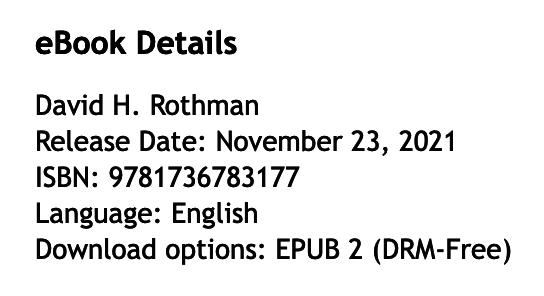
Skimming news reports, some optimists may think they’ll soon be able to send their existing Kobo, Apple, or Nook books to Kindles since those other brands use ePub.
But DRM in many cases will still get in the way—even with Amazon’s Send to Kindle feature being able as of late 2022 to convert ePub to a Kindle format.
So here’s a question. Could the anti-DRM movement take advantage of this customer confusion? Let’s remind ebookers that DRM, not format, may now be the sole obstacle to enjoyment of their previous purchases on many different devices.
The longer ebooks are around, the more people have invested in DRM-tainted ebooks (thousands of dollars in some cases). So that bodes well for the anti-DRM movement when users find they can’t suddenly transfer the books to Kindles or other devices without fuss.
Meanwhile people can check book listings in the Amazon and Kobo stores and elsewhere to see—before buying—if they have DRM. On Amazon, look for “Simultaneous device usage : Unlimited.”
Enlarged, here’s the file-related information in the Kobo listing for a recent thriller of mine:

As for existing books you own, you can try calling them up in Calibre or another multi-format app to see if DRM would get in the way. Or you can just try Send to Kindle once ePub conversion is in place.
Needless to say, it will be helpful to convey your own anti-DRM sentiments to authors, publishers, and literary agents. Either no DRM or watermarking would be better. Imagine being able to buy most any books in the Kindle store or others without worrying about DRM! To Amazon’s credit, it’s like Kobo and doesn’t make DRM compulsory. But most large publishers stubbornly use DRM even though it is a threat to our property rights or what should be our property rights (DRMed ebooks cannot be truly owned in the traditional sense).
Detail #1: Remember, Kindles still won’t be able to read ePub directly–at least not based on what we know so far. Please, Amazon, give us native ePub, at least on apps and newer devices, without need for conversion.
Details #2: DRM, alas, does make sense for libraries using the one-checkout-at-a-time model which treats ebooks like paper books.
Detail #3: Outrageously, it is technically illegal to circumvent DRM even for personal purposes—yes, nonpiracy use (where you’re not sharing a book). This needs to change!
Featured image credit: Karen Rustad, Claremont, California. CC licensed. This is a 2007 photo. The fight goes on!
Editor’s Note: This article is republished with permission of the author with first publication on his site, TeleRead.
